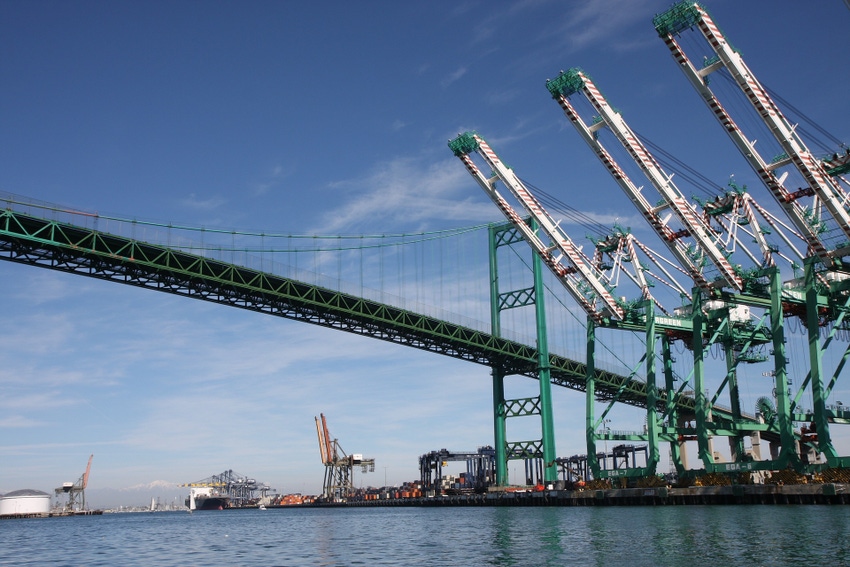West Coast port work stoppages disruptive for beef exporters
Situation hurts competitive position of the U.S., undermines reputation as a reliable supplier.
June 14, 2023

Labor contract negotiations between West Coast longshoremen and ocean terminal operators have been ongoing for more than a year and the previous contract expired nearly 12 months ago. While there are no long lines of ships waiting at anchor – as seen during past labor disputes – the situation is still very troubling for exporters of U.S. beef and for all levels of the beef supply chain.
Over the past year, despite lack of a labor contract, cargo movement was fairly steady on the West Coast, although sporadic work stoppages sometimes caused outbound shipments to be delayed. Port congestion has been minimal, but this is mainly because many importers have chosen to shift discretionary cargo to the East and Gulf Coasts until the International Longshore and Warehouse Union (ILWU) and the Pacific Maritime Association (PMA) announce a tentative labor agreement. This is not a positive development for the U.S. beef industry, which relies on robust vessel service on the West Coast to serve its large Asian markets in a timely and reliable manner.
This is especially true for exporters shipping chilled (never frozen) beef to destinations such as South Korea, Japan, Taiwan and China. Asian buyers pay a premium for this high-quality product, which must depart the West Coast on schedule because of its limited shelf life. Through April of this year, the chilled premium on U.S. beef, when compared to frozen, was 113% for Taiwan and ranged from 72% to 83% for Japan, Korea and China.
If a chilled shipment is delayed, a number of scenarios – none of them good – unfold. The product might have to remain in the domestic market, where it will most likely be sold at a discount. Or it might have to be frozen prior to or during transit across the Pacific, ensuring a significant discount. Short delays might still allow the product to be shipped chilled, but under a very tight timeline for reaching the end user.
“It’s not a situation that either an exporter or a buyer wants to be in,” said U.S. Meat Export Federation (USMEF) President and CEO Dan Halstrom. “When this happens, it hurts the U.S. industry’s competitive position and undermines our reputation as a reliable supplier.”
While the tense situation at the West Coast ports is not the only contributing factor, chilled product is currently making up a declining share of U.S. beef exports to Asian markets. For example, in the first quarter of 2023, beef exports to Japan were 52% chilled – down from 53% last year and down from 61% in 2021. First quarter exports to Korea were 24% chilled, compared to 26% last year and 31% in 2021. In Taiwan, where the U.S. is the dominant supplier of chilled beef, 39% of first quarter exports were chilled – up slightly from last year but down from 52% in 2021.
“There are circumstances on both sides of the Pacific that have slowed chilled beef exports to these markets, but the uncertainty at our West Coast ports is definitely an obstacle,” Halstrom said. “Because chilled product generates such tremendous returns, this is a trend we are hoping to reverse in the second half of 2023. But that’s going to be difficult unless a labor agreement is reached soon.”
On a positive note, the U.S. industry is moving a larger percentage of chilled beef to China – 14% in the first quarter of this year, compared to just 9% in 2022 and 2021. This is due in part to China’s removal of COVID-related inspection and package disinfection requirements for imported cold chain products, which slowed entry into the market. These requirements were lifted in January.
“Exporters who may have been reluctant to ship chilled beef to China now see more opportunities to do so,” Halstrom explained. “There is enormous potential for growth in this category, but again this is dependent on reliable cargo operations on our West Coast.”
The port labor situation has been especially unsteady since June 1, when contract talks between the ILWU and PMA broke down, with the two sides reportedly remaining far apart on wages. This prompted slowdowns at container terminals across the West Coast and forced the Port of Oakland to suspend operations for three days. Negotiations resumed June 6 and cargo movement improved in subsequent days at California ports. However, productivity at Pacific Northwest ports remained very low. On June 9, ground operations at the Port of Seattle were halted completely. Sporadic delays and disruptions continued into the week of June 12.
USMEF is working with industry partners to voice concerns about the impact of this situation, not only on red meat exports but also the entire agricultural economy.
“Don’t be fooled by a lack of ships backing up on the West Coast, because this is troubling for both the short and long term,” Halstrom said. “The recent interruptions are frustrating enough, but perhaps a bigger concern is that our West Coast ports are losing business and becoming viewed as unreliable. That’s not in anyone’s best interests, whether you’re an exporter, a buyer, a terminal operator or a longshoreman.”
About the Author(s)
You May Also Like
.png?width=300&auto=webp&quality=80&disable=upscale)


